The Christmas giving continues with a giveaway of one digital copy of A Ruby Christmas! Leave a comment after this post for a chance to win!
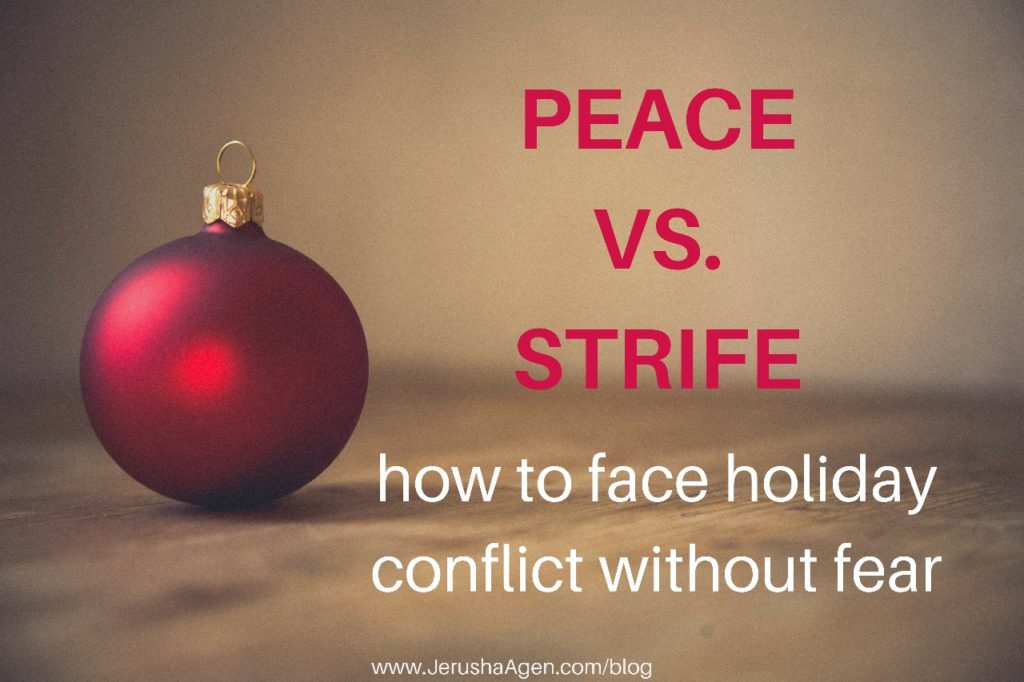
Christmas is ruined.
You end the phone call and drop the smile you’ve plastered in place to cover your plummeting emotions. Aunt Martha is coming for Christmas. Not just Christmas Day, but Christmas Eve. And Christmas Day Observed.
Bad enough your ex-sister-in-law is already insisting on showing up early to make the gravy she claims you spoil every year. Adding Aunt Martha with her negativity and crass humor is like adding alcohol to a fire that’s incinerating your Christmas tree.
Your stomach twists and your heart pounds in your ears. What are you going to do?
Sound familiar? Substitute the names and problems of your relatives, and this little scene could probably be about you…or any of us. A sad fact of living in a fallen world is that our relationships are not what they should be. They’re breaking and broken.
The tension they bring is hard enough for daily living, but at the holidays, those conflicts can become worse when people who normally avoid each other are thrown together. What makes this reality even harder is that the holiday season is supposed to be a time of love, peace, and joy, not throw-downs and hurt feelings.
But there’s good news: the fear of conflict with family or friends doesn’t have to ruin your Christmas. You don’t have to be afraid at all.
Following these six tips, gleaned from Colossians 3:12-15, can free you from the fear of holiday conflict and even bring peace to you and your loved ones this holiday season:
1. God’s Chosen Ones
In Colossians 3:12, the Apostle Paul lists virtues that we’re supposed to “put on,” when dealing with others. But before he goes into that list, he makes the point about why we’re putting on those virtues: because we are “God’s chosen ones, holy and beloved.”
If you’re a Christian, you are holy (set apart) and beloved. Nothing else matters. Not your ex-sister-in-law’s criticism or Aunt Martha’s biting wit.
You are beloved by the Creator of the universe, the author and savior of your life and eternity.
Wrap that truth around your heart, let it sink into your soul, and pull it out to remind yourself any time the family tension gets too personal.
But also remember this—you are set apart to be different than your bickering family. Through the power of the Holy Spirit within you, you will be able to bring peace and love to your family and friends in the midst of conflict this year.
2. Compassion & Kindness
You might be snorting with a, “Yeah right,” at this moment. But this is really possible with God’s help. Pray that He would give you the kind of understanding for that difficult person that will lead you to compassion.
Once you can find a way to feel compassion, kindness will follow. Peace is often the result. But if not outwardly, you’ll still have more peace in your heart, which has been softened toward that person.
3. Humility & Meekness
I know, neither of these traits are considered virtues in American culture, especially meekness. But God tells us to be meek and humble. As with everything that our Lord commands, there are benefits if we obey.
In this case, if we can practice meekness and humility this holiday season, we will have peace instead of conflict. Yes, the other person is likely to blame for the problems, but our response, which almost always comes out of pride or thinking about ourselves, actually brings about the conflict.
In a terrific and timely handbook for Handling Holiday Conflict, Amanda Cox, cuts to the heart of this point and makes it practical in her section, “Don’t Fear Silence.”
You don’t have to respond to every insult. You don’t have to answer every challenge, convince others you’re right or that you’re valuable (remember Tip #1).
Think of silence in such cases not as awkward or uncomfortable, but rather as the manifestation of peace that you hoped for this holiday!
 4. Patience
4. Patience
This one is tough, but I think there’s a reason it follows humility and meekness in Paul’s list. If you’re practicing Tip #3, patience will come naturally.
The reason we tend to be impatient with those difficult people in our lives is because of our pride, our need to defend ourselves, to be right (even if being right takes the so-called “compassionate” form of pointing out to the other person that they need help).
As an extension of patience, Paul adds, “bearing with one another.” This image is so powerful, and a not-so-subtle reminder of why we should be patient.
We are likely part of the conflict, but even if we aren’t, we do or say things at other times that require our loved ones to have patience with us.
Remember that others are bearing with you. Then bearing with others, including that difficult individual, will become much easier.
5. Forgiveness
This tip is really hard. But as with patience, the key to practicing true forgiveness is to remember that the Lord has forgiven you. We don’t tend to believe it because of our fallen natures, but God has forgiven us SO much more than ANY offense ever committed against us.
Yes, any. Even the worst crimes or betrayals you can imagine. We’ve done worse to God, our Creator. And He forgave us.
But that forgiveness came at a tremendous cost—the murder of His only Son. Jesus Christ, His Son, who came to our world as the baby we celebrate at Christmas, grew up, and chose to die on the cross for us. He died so that our sins would be washed away by His blood. So that we would no longer live in and die to sin, but so that we would have eternal life in Him and be able to enjoy and glorify Him forever.
He died, so that we could be forgiven.
That’s the ultimate cost of forgiveness, and God paid it.
By comparison, the cost we have to pay to forgive someone who’s wronged us (and, yes, there is always a cost), is minuscule.
The reward for that forgiveness is astronomical.
 6. Love
6. Love
Paul makes clear that love is the most important of the virtues, when he says, “above all these put on love, which binds everything together in perfect harmony.”
Love needs to be first, last, and constant during everything in between. If you practice the other tips, you will discover that you also have love. Because love drives all of these virtues. The other virtues are love, put into practice.
Instead of strife and stress this Christmas and New Year, how would you like to have “perfect harmony?” Put on love.
Want peace? Put on love.
As with forgiveness, we can “love because He first loved us” (1 John 4:19). While we were still sinners, His enemies, Christ died for us (Romans 5:8). That’s love.
Would you die for that challenging person in your life? Would you die to yourself, swallowing your pride and self-asserted righteousness to love that person?
Remember Christ’s love for you, and love should overflow from you to others.
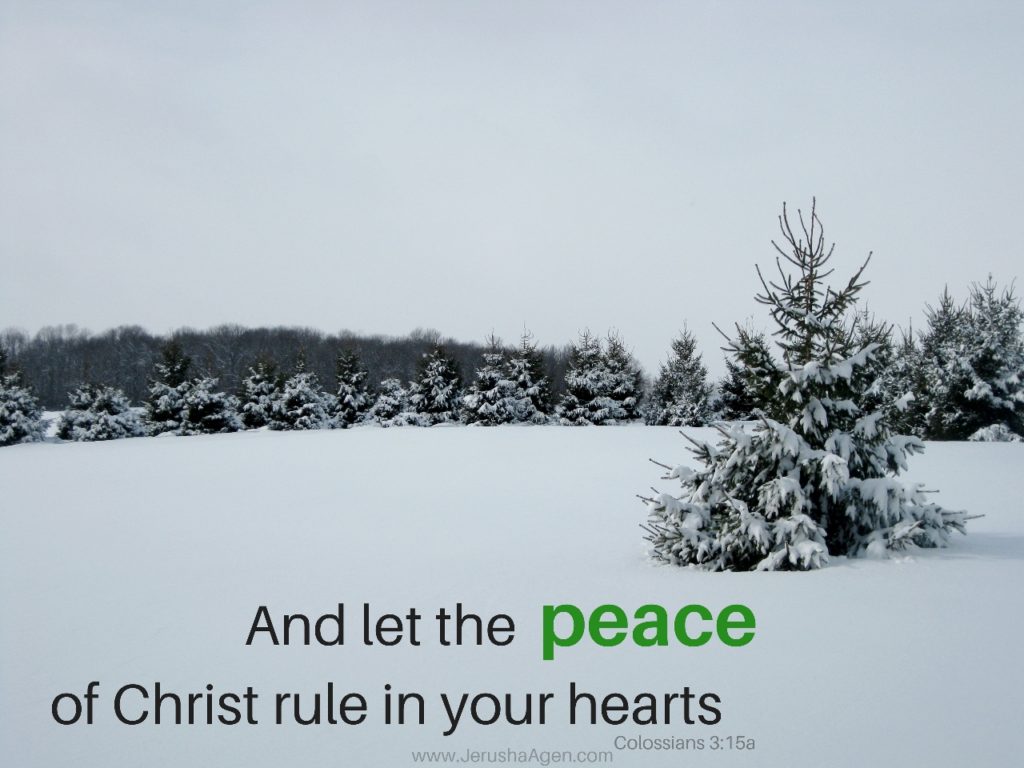 “And let the peace of Christ rule in your hearts, to which indeed you were called in one body.” We were called to peace.
“And let the peace of Christ rule in your hearts, to which indeed you were called in one body.” We were called to peace.
Let peace rule in your hearts instead of fear, and you’ll have a merry, merry Christmas.
For more helpful, practical tips for diffusing conflict this holiday season, download Amanda Cox’s free (yes, free!) Quick Guide to Handling Holiday Conflict (click here). I highly recommend this resource if you have difficult people in your life.
Which of these tips resonated with you? How are you planning to tackle conflict this holiday season? If you never have conflict over the holidays, please share the key!
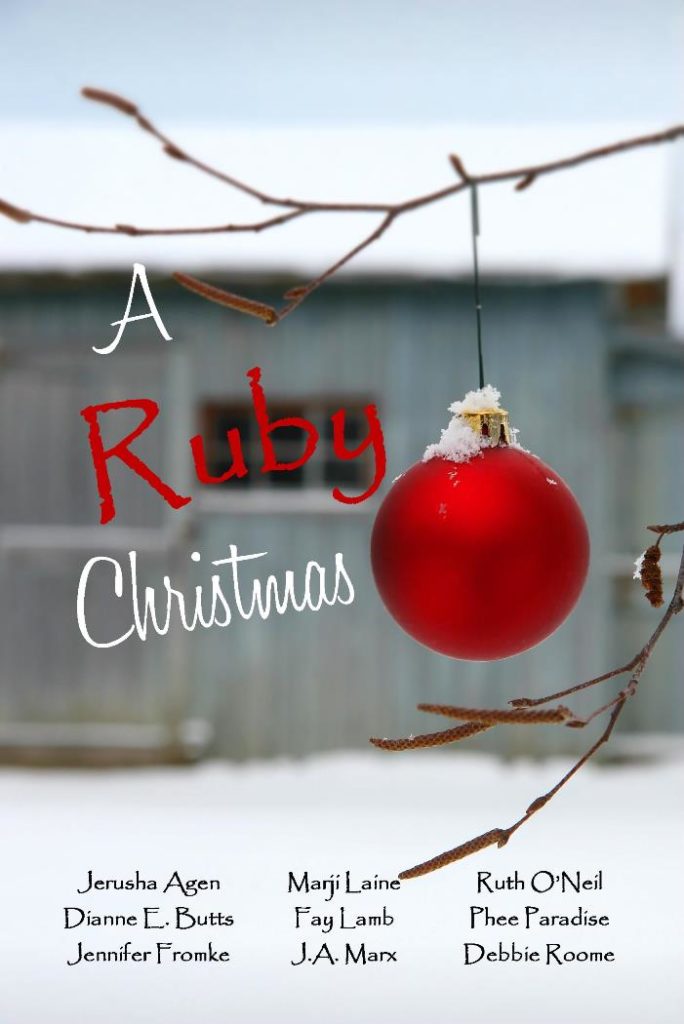 Comment below for a chance to win one free digital copy of A Ruby Christmas
Comment below for a chance to win one free digital copy of A Ruby Christmas
(Winner randomly selected December 2016.)
Ruby Joy Buckner, cowgirl, has never left the Lone Star State, but at her father’s request, she takes her faithful canine companion and travels the world in search of Nativity pieces.
As Ruby collects the pieces, she also collects a few unexpected surprises, including an awareness of the beauty in other cultures, and a menagerie of new friends, thanks in part to her dog, Yippee Ti Yi Yo, who charms everyone they meet.
Ruby’s budding awareness of life outside Texas opens her eyes to a world of whimsy, and the Nativity pieces she collects are unusual.
Will her father approve her eclectic collection … and the changes that travel brought to Ruby’s life?



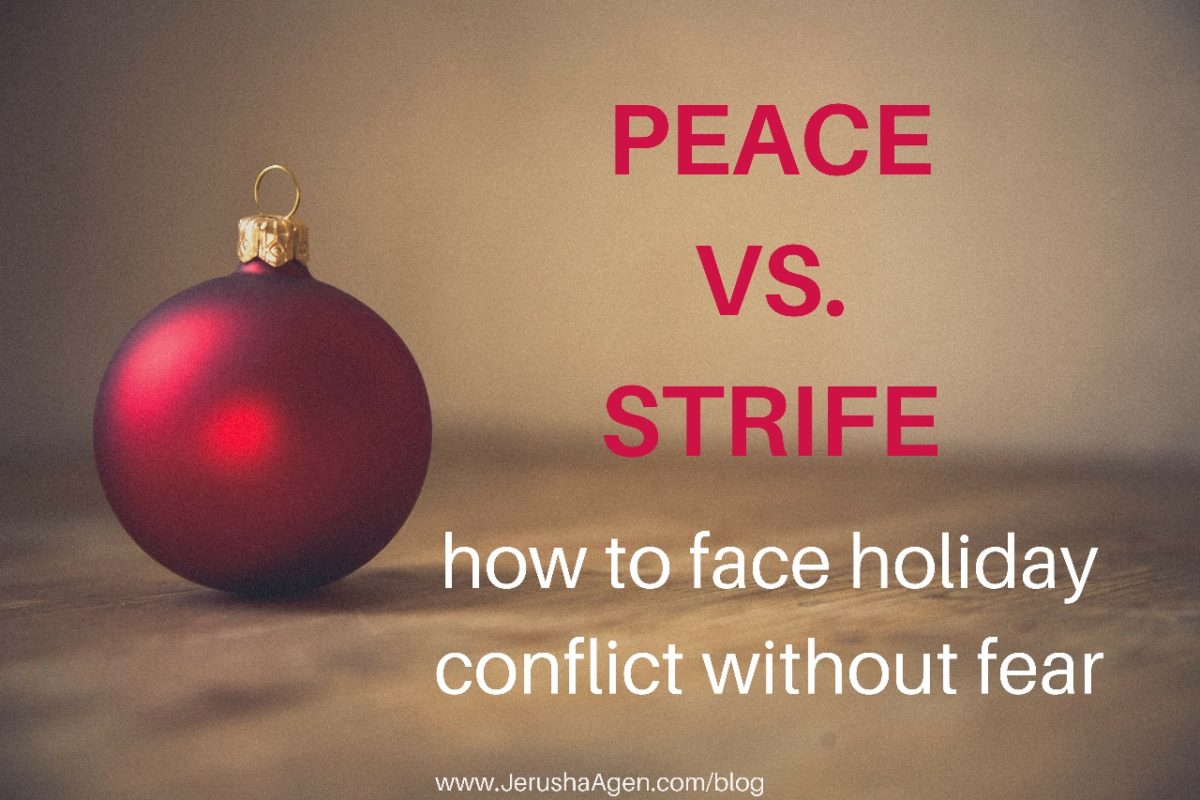
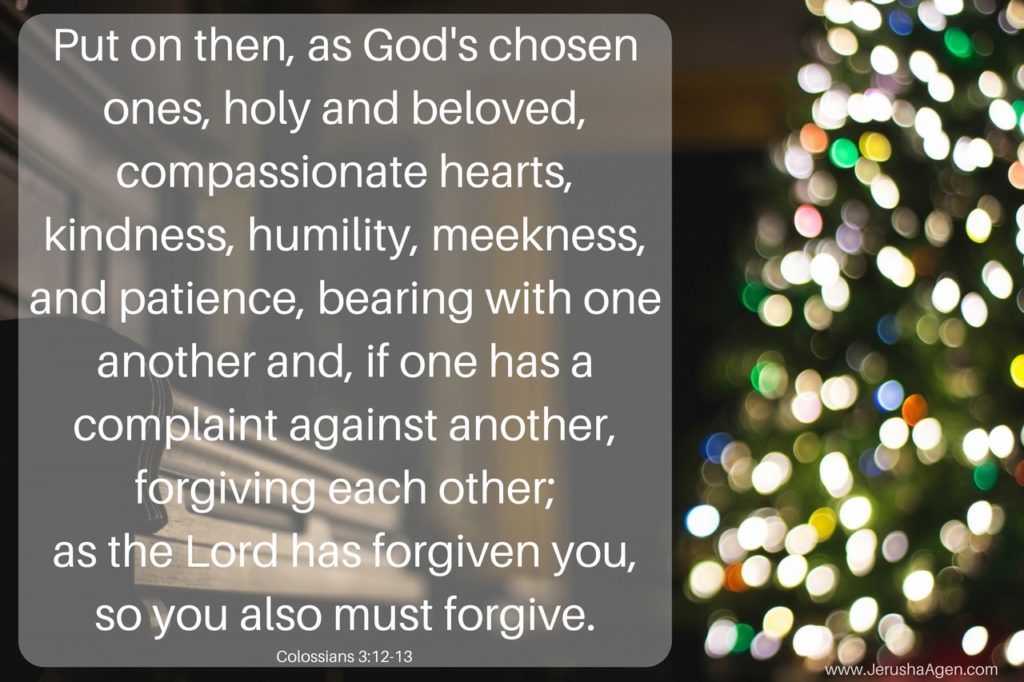
Comments 10
Jerusha, thanks so much for this helpful post on conflict — it applies so well to other times and people in our life, not just our relatives at Christmas! I really appreciate your comments on forgiveness and love; this is exactly what I’ve been teaching the girls in my discipleship group (we’re currently going through the fruit of the Spirit). YES, God has forgiven us SO much that we should be willing to forgive others for their comparatively small sins against us (Matthew 18:23-35). We can’t even begin to fathom how much He has forgiven us, and how much He loves us in Christ! But once we begin to glimpse this wonderful truth, love for others is an automatic outflow. As Pastor Frank would say, we need to remember the cross of Calvary and what Jesus has done for us every day. That’s something to celebrate EVERY day, not just at Christmas!
Thank you again, and God bless your day! 🙂
Author
Thanks for your insightful comment, Beth! You’re so right that these responses to conflict can be applied all year through. Yes, remembering what Christ did for us, and really understanding that (as much as we can this side of heaven) is the key. I know it can be hard to let that truth shape our responses to others, though, when the pain of an offense seems just too much to forgive. But we need to understand that our offenses are really much greater and yet we’re forgiven. As you say, that is indeed something to celebrate! Thanks for that reminder, Beth. Hope you have a wonderful Christmas!
You’re right — it is difficult to forgive in the moment (as well as in the aftermath) of dealing with those who hurt and offend us! I guess that should make us more aware of our need to be more like Christ in all our responses, and of our need to depend more on Him for help.
Thank you, and I hope that you also have a wonderful Christmas with your family!
Oh, Jerusha! I needed this! Thank you so much for the reminder that I’m beloved and that it is possible to have peace at Christmas. Heading to download that book now. 🙂
Author
I’m so thankful God used the post to help you, Angie! It’s hard to imagine anyone as sweet as yourself having conflict at Christmastime, but I know we all have difficult people in our lives. I think you’ll find Amanda Cox’s guide really helpful. I’ll pray that you do have peace this Christmas. Merry Christmas, Angie!
Well timed and a reminder I, and probably lots of people, needed! The one that stood out to me was “you don’t have to respond to every insult.” Silence speaks volumes, really. Especially if someone else is being rude, abrasive, or insulting. Responding with nothing emphasizes their tone even more. Sometimes enough for them to notice it and make a change (one can hope, right?!). I’ve heard it said that every family has one difficult person, and if you don’t immediately know who it is…it’s probably you. 🙂 Praying that God will bring these wise reminders to my mind while around my family’s difficult one this Christmas.
Author
Haha, I love that one, Susan–if you don’t know who the difficult person is, it’s probably you! Hmm, I’ll have to think about that. 🙂 That tip of silence is the hardest for me, but I think one of the most effective. You’re right, keeping your silence is a great way to hopefully make the person aware of what they’re doing (one of those “heap burning coals on their head” moments? 🙂 ). Thanks for taking the time to join the conversation, Susan! I’ll pray that your family conflict is defused this year as you show the love of Christ to the most difficult.
Author
Oh, and do check out Amanda Cox’s holiday conflict guide, Susan (I linked to it in my post above). She has some terrific, practical tips that might be just what you need to handle that difficult person this Christmas!
Thank you for tips to help get through the Christmas season, with biblical principles. That makes all the difference in the world. The spiritual world that is. Without it, people would be nasty, mean, and unkind. Thankfully we can have the peace that surpasses all understanding, when needed the most!
Author
Oh, yes, Jacqueline! Isn’t that a wonderful promise? That we can have the peace that surpasses all understanding. Love that one. You’re so right that our greatest strength and hope is found in Scripture. Thanks so much for stopping by and joining the conversation!